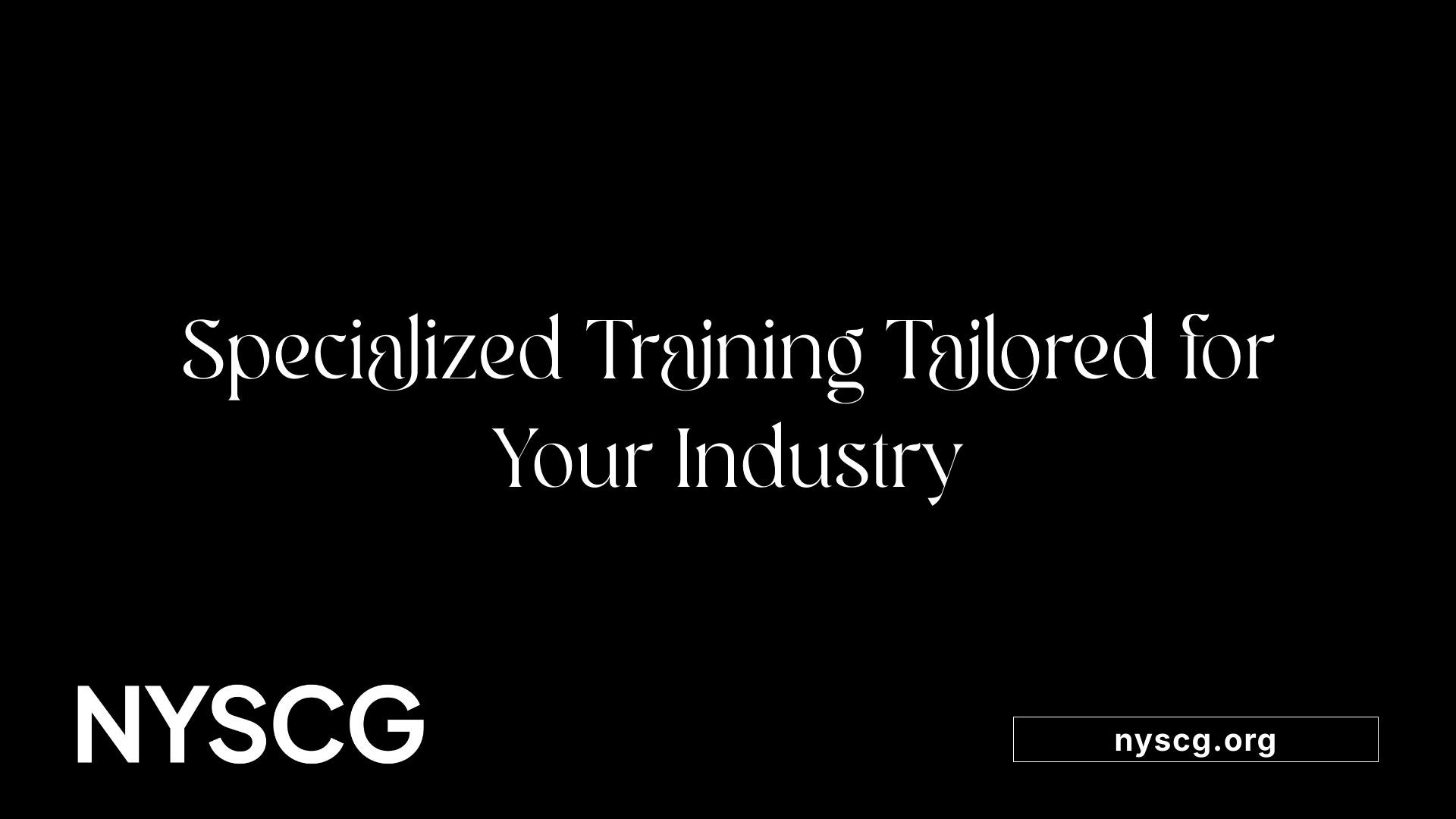What Ongoing Training Is Available After Certification?


In today’s dynamic job market, the value of initial certification goes beyond just obtaining a credential. Ongoing training and professional development are crucial for maintaining relevance, advancing careers, and staying compliant with industry standards. This article explores the diverse array of training opportunities available after initial certification, from quick certifications to industry-specific advanced programs, providing a comprehensive guide to lifelong learning.
 Many individuals seek to expand their skills after earning initial certifications or licenses. Fortunately, there are numerous fast and accessible options to enhance your qualifications through workshops, seminars, online courses, industry-specific training, and professional certifications.
Many individuals seek to expand their skills after earning initial certifications or licenses. Fortunately, there are numerous fast and accessible options to enhance your qualifications through workshops, seminars, online courses, industry-specific training, and professional certifications.
Workshops and seminars provide focused, short-term learning experiences on specific topics or skills. These can be ideal for brushing up on new industry trends or practical techniques without a significant time commitment. They are often led by industry experts and can be attended in person or virtually.
Online courses offer flexibility, allowing you to learn from home and at your own pace. Platforms like Coursera, Udemy, and LinkedIn Learning feature courses in areas such as technology, business, healthcare, and trades. Many of these courses offer micro-credentials or certificates that can be added to your professional profile.
Industry-specific training programs are designed to meet the evolving needs of various fields. For example, manufacturing professionals might pursue advanced training in automation or additive manufacturing, while healthcare workers could take specialized courses in new medical technologies or patient care techniques.
Earning professional certifications can significantly boost career prospects by validating your expertise. Many certifications have quick turnaround times, especially entry-level options. For example, healthcare certifications like Certified Nursing Assistant (CNA), Phlebotomist, Home Health Aide, and EKG Technician generally take one to three months to complete and involve passing a national exam.
Similarly, there are quick certifications in IT and business fields. Certifications from providers like Amazon Web Services (AWS), Google, and Cisco often involve passing assessments that can be completed in a short period. Other simple, yet valuable certifications include first aid, CPR, food handler permits, and basic technical or service-related licenses.
Acquiring these credentials not only enhances your resume but can also open doors to new job opportunities and career advancement. They require a relatively small time investment but can have a lasting impact on your professional journey.
For further exploration of available opportunities, searching for 'post-certification training programs' can provide additional resources and programs tailored to your industry and career goals.
 Post-certification training programs are vital for enhancing skills, advancing careers, and fostering ethical standards within various industries, especially law enforcement, healthcare, and manufacturing.
Post-certification training programs are vital for enhancing skills, advancing careers, and fostering ethical standards within various industries, especially law enforcement, healthcare, and manufacturing.
These programs offer numerous advantages. They help professionals refine their technical abilities, stay updated with industry best practices, and develop a strong sense of ethics and responsibility. Such training not only broadens their scope of practice but also boosts confidence and competence, making them more effective in their roles.
Training durations vary widely based on the field and level of certification. For instance, basic law enforcement academies typically last at least 664 hours, often exceeding 1,000 hours. These comprehensive courses include physical training, mental conditioning, tactical skills, and legal education.
Advanced certifications often demand additional time. For example, some programs incorporate 16-week paid basic courses, which are supplemented by in-house or on-the-job training phases. These extended timelines ensure officers and professionals are thoroughly prepared to handle diverse challenges.
In manufacturing and technical fields, on-the-job training and specialized certification programs may last from several weeks to months, allowing workers to master complex equipment like PLCs, robotics, and control systems.
Overall, these durations are designed to promote ongoing professional development, maintain high standards, and improve public safety and service quality. Such comprehensive training underscores the importance of continuous learning in today’s ever-evolving job landscape.
 After obtaining initial certification, professionals frequently seek further education to enhance their skills and advance their careers. These additional qualifications include a variety of training courses and credentials tailored to specific industries and roles.
After obtaining initial certification, professionals frequently seek further education to enhance their skills and advance their careers. These additional qualifications include a variety of training courses and credentials tailored to specific industries and roles.
One prevalent category is advanced certifications. These are designed to deepen expertise in a particular field or prepare individuals for higher responsibilities. For example, law enforcement officers might pursue specialized certifications such as Supervisory, Management, or Executive Certificates. Agencies like the Federal Law Enforcement Training Centers (FLETC) also offer workshops and courses aimed at continuous professional development.
Specialized industry certificates are another common form of post-certification credentials. These certificates often focus on niche skills or compliance standards necessary for industry-specific roles. They are essential in fields like manufacturing, healthcare, and information technology, allowing workers to maintain competitive edge and meet regulatory requirements.
Refresher courses play a vital role in maintaining certification validity and keeping professionals updated on the latest practices and regulations. These courses are refreshed periodically and can cover a wide range of topics from safety protocols to technological advancements.
Here is a breakdown of typical post-certification training options:
| Type of Training | Description | Typical Examples |
|---|---|---|
| Advanced Certifications | Further specialization or management-focused credentials | Supervisory, Management, Executive Certifications |
| Industry Certificates | Specific skill or compliance-focused credentials | OSHA Safety Certification, Certified Medical Assistant |
| Refresher Courses | Courses to update skills or knowledge periodically | Safety refreshers, advanced cyber security workshops |
Many organizations and agencies encourage ongoing professional development through these programs. For instance, law enforcement agencies commit to continuous training through courses that support promotion or specialization, helping officers stay current with evolving laws and practices.
Overall, the variety of certifications and training options available after initial qualification ensures that professionals can keep pace with industry demands, improve their qualifications, and pursue career growth.
 What are the ongoing training options available after certification?
What are the ongoing training options available after certification?
Post-certification training plays a crucial role in keeping professionals current and proficient in their fields. For law enforcement personnel, ongoing education options are diverse and tailored to meet evolving industry challenges. These include refresher courses that reinforce foundational skills, advanced training programs that delve into specialized areas such as mental health crisis management, and leadership development seminars aimed at preparing officers for supervisory roles.
Many of these training opportunities are developed through collaborations with federal, state, and local agencies to ensure relevancy and compliance with industry standards. Resources such as online portals, training videos, publications, and certification management tools help officers track their training progress and maintain their qualifications.
Agencies like POST (Peace Officer Standards and Training) and DCJS (Division of Criminal Justice Services) offer comprehensive training curricula, which include mandated entry-level courses as well as advanced specialization modules. These programs increasingly utilize modern instructional methods like web-based courses, teleconferences, and smart classrooms.
International and specialized programs like the FBI Academy or the National Academy also provide leadership, management, and technical training for law enforcement professionals seeking to enhance their skills and knowledge. Seminars and workshops through organizations like ALERRT (Advanced Law Enforcement Rapid Response Training) further enrich ongoing professional development.
How does continuous education align with ongoing professional requirements or industry standards?
Continual education aligns closely with professional requirements and industry benchmarks by ensuring that workers stay updated with the latest technological advancements and regulatory changes. Many fields, including healthcare, IT, and finance, demand that practitioners obtain certifications or micro-credentials which are regularly renewed or upgraded to demonstrate current competence.
Educational institutions and industry bodies adapt their curricula based on labor market analytics, feedback from advisory panels, and real-world industry shifts, ensuring training remains relevant. This process often involves integrating new skills, tools, and methodologies into existing programs.
This alignment supports compliance with licensure requirements, while also fostering career mobility and growth. For example, healthcare professionals regularly update their skills through courses in emerging therapies or healthcare policies, directly impacting their ability to meet industry standards and improving patient care.
Ultimately, ongoing professional education helps workers navigate a rapidly changing landscape, ensuring they possess the latest skills needed to succeed and maintain industry credibility.
 Ongoing training plays a vital role in fostering career advancement and skill growth. When employees participate regularly in training programs, they stay updated with the latest industry standards and develop new competencies that are essential for emerging roles. This process not only boosts their confidence but also empowers them to take on higher responsibilities with greater effectiveness.
Ongoing training plays a vital role in fostering career advancement and skill growth. When employees participate regularly in training programs, they stay updated with the latest industry standards and develop new competencies that are essential for emerging roles. This process not only boosts their confidence but also empowers them to take on higher responsibilities with greater effectiveness.
Many organizations see professional development as a way to motivate and engage their workforce. Employees who have access to continuous learning opportunities tend to be more satisfied with their jobs, exhibit higher performance levels, and demonstrate stronger commitment to the company. These benefits contribute to increased retention rates, reducing costly turnover.
Furthermore, training enhances current skills while preparing employees for future leadership positions. It helps them hone their existing strengths and develop new ones, facilitating personal growth and career mobility. As a result, organizations benefit from a more competent and adaptable workforce that drives innovation and productivity.
Investing in career development through training not only benefits individual employees but also strengthens the organization by creating a culture of continuous improvement. Employees become more capable, confident, and aligned with organizational goals, ultimately supporting long-term success.
The landscape of professional training is rich with opportunities that extend well beyond initial certification. From short-term licenses to advanced industry-specific certifications, ongoing education is essential for staying competitive, compliant, and capable in any field. By leveraging these diverse programs—whether online, in-person, or blended—professionals can continuously refine their skills, expand their expertise, and accelerate their career trajectories. Embracing lifelong learning not only benefits individual growth but also fosters organizational success and industry innovation. The key is to stay informed, seek out relevant opportunities, and remain committed to personal and professional development in an ever-evolving workforce.
All you need is the will to make the world a better place.
New York State chaplain group inc. is a tax deductible organization with a federal tax Id number 92-383-4921